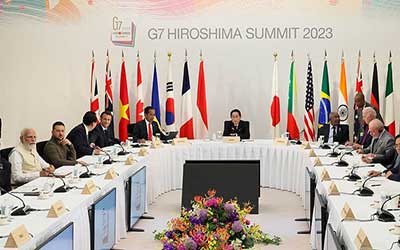Date : 26/05/2023
Relevance: GS-2: Bilateral, Regional, and Global Groupings and Agreements involving India and/or affecting India’s interests.
Key Phrases: G-7 in Hiroshima meet, Hiroshima Vision Statement on Nuclear Disarmament, Memorial Visit, Humanitarian Perspective, G-7's Limited Representation, Global Warming, transparent financing, debt sustainability.
Why in News?
- The recent meeting of the G-7 in Hiroshima, Japan, led by Prime Minister Fumio Kishida, aimed to convey a message of global solidarity for peace.
- While the G-7 issued a special "Hiroshima Vision Statement on Nuclear Disarmament," the summit's statements revealed a limited perspective, failing to represent the diverse global landscape.
Symbolism and Significance:
- Japanese Prime Minister's Message:
- Prime Minister Kishida, a native of Hiroshima, sought to emphasize global solidarity for peace by hosting the G-7 meeting in the city.
- Memorial Visit:
- The leaders of all G-7 members, along with EU leadership, visited the peace memorial, underscoring the symbolic importance of acknowledging the victims of the 1945 atomic bombing.
- Hiroshima Vision Statement:
- The G-7 released a special statement on nuclear disarmament, highlighting their commitment to eliminating nuclear weapons.
Key Highlights of the Hiroshima Meet:
- Biden's Presence:
- The presence of U.S. President Joseph Biden, only the second sitting American President to visit Hiroshima, highlighted the summit's significance.
- Ukrainian President's Arrival:
- Ukrainian President Volodymyr Zelenskyy's unexpected attendance shed light on Russia's invasion, emphasizing the importance of addressing global conflicts.
- Humanitarian Perspective:
- Indian Prime Minister’s statement, characterizing the crisis as a matter of "humanity," drew attention to the broader implications of conflicts and the need for humanitarian solutions.
- Lack of Dialogue:
- While the G-7 issued a statement on Ukraine imposing sanctions on Russia, it failed to outline a path toward dialogue and ending the war, highlighting the limitations of the grouping's approach.
The Need for Inclusivity:
- G-7's Limited Representation:
- The G-7, consisting primarily of Euro-American countries, does not accurately reflect the global landscape.
- With less than a third of the global GDP and just over a tenth of the world's population, it lacks adequate representation.
- Expulsion of Russia:
- The G-7's decision to exclude Russia following its annexation of areas in Georgia (2008) and Crimea (2014) further limited the grouping's perspective.
- Exclusion of Major Economies:
- Not including economies like China and India, which are among the world's largest and fastest-growing, raises questions about the G-7's ability to address global challenges effectively.
- Ignoring Responsibilities:
- Efforts towards the Developing World:
- Despite the Hiroshima summit's intent to acknowledge the G-7's responsibilities towards the developing world, concrete measures were noticeably absent.
- The summit made efforts to promote transparent financing and debt sustainability as steps in the right direction.
- However, further action was required to effectively alleviate the burdens faced by developing nations.
- Compensation for Global Warming and Emissions:
- One of the key responsibilities of the developed world is to address its contributions to global warming and greenhouse gas emissions.
- While the summit recognized this obligation, it failed to propose specific actions or mechanisms to compensate for these detrimental impacts.
- Concrete measures to mitigate the consequences of climate change were notably absent from the summit's agenda.
- The Need for Tangible Commitments:
- While the G-7 summit demonstrated a willingness to engage with the challenges faced by the developing world, the lack of concrete measures hampered its effectiveness.
- Merely acknowledging responsibilities without offering practical solutions limits the impact of the G-7's efforts.
- Tangible commitments are crucial to ensuring meaningful progress in addressing global issues and achieving sustainable development.
- Efforts towards the Developing World:
Looking Ahead: A More Comprehensive Outlook:
- The G-20 Summit:
- As attention shifts to the upcoming G-20 summit in Delhi, hopes are high for a more inclusive outlook.
- The G-20 can play a crucial role in building a comprehensive global consensus on pressing challenges.
- Inclusive Measures:
- It is crucial for the G-7 to recognize its limited representation and take steps to include a broader range of countries.
- This would lead to a more comprehensive approach to tackling global issues.
- Global Consensus:
- By expanding its prism, the G-7 can foster a more inclusive and diverse dialogue, promoting a better understanding of the world's challenges and facilitating meaningful solutions.
Conclusion:
- The Hiroshima meet of the G-7 served as a reminder of the importance of global solidarity for peace.
- However, the summit also highlighted the need for the G-7 to evolve and become more representative of the world today.
- As an economic grouping, it must strive to include major economies and diverse perspectives.
- Concrete measures addressing pressing global challenges, particularly those faced by the developing world, are essential.
- The spotlight now turns to the G-20 summit, where a more inclusive approach can contribute to the creation of a comprehensive global consensus and pave the way for a brighter future.
Source: The Hindu
Mains Question:
Q. Discuss the limitations of the G-7 as a global forum and highlight the need for inclusivity in international decision-making processes.







